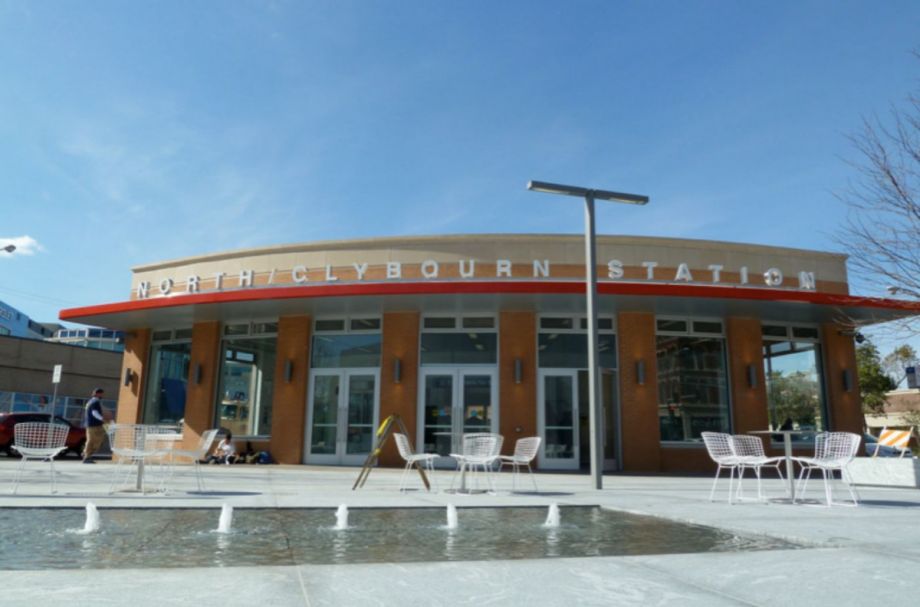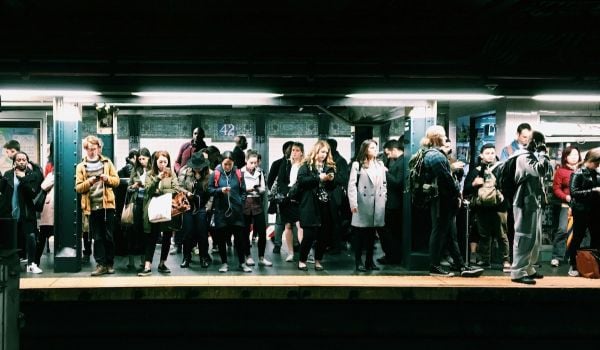At the intersection of Clybourn and North Avenues in Chicago, just a few blocks from the former site of one of the country’s most infamous public housing projects, is a completely renovated subway station. Though much of the city’s transit system has been substantially remade in recent years, this improved stop has the unique honor of having been paid for by Apple Computer. It’s the latest reflection of the most recent trend in America’s urban centers: Encouraging private corporations to contribute to the costs of improving public infrastructure.
Before visiting the station, which serves the city’s Red Line rapid transit corridor, I have to admit I was skeptical of its implementation. Suffice it to say I came away impressed when I stopped by last week. Outside, the stop’s headhouse has been entirely renovated, with a new glass and brick facade. Below, what was apparently once a dank and decrepit place is a shining monument to minimalism, with bright and white (Apple) advertisements, whitewashed walls, and general cleanliness. It’s not particularly crass or overly commercial. Rather than the depression one frequently experiences when entering a subway station, this stop — first built in 1943 — feels entirely up-to-date and comfortable.
Even better is the outdoor experience, where Apple has created an austere but welcoming plaza between the main station entrance and its new retail store. The public space, replete with a fountain in its center and tables and chairs scattered around its edges, is a nice place to sit whether using the station, Apple Store, or simply walking around the neighborhood. All that it’s missing is a Starbucks serving coffee on one side and a department store on the other.
That, indeed, is the problem: While Apple’s contribution to the station renovation is commendable (when was the last time another company made a similar commitment to any city’s transit system?), the truth is that its motivations are clearly concerned primarily with profit rather than the public interest. The end result is an urban version of the contemporary “lifestyle” outdoor mall found ubiquitously in the suburbs. Apple wanted a nicer transit station for its new computer store, just as it would have insisted on a parking lot in an automobile-oriented area. So it paid for it when it set up shop, and made sure that the entrance to the store — with the giant white logo — stands directly across the lovely fountains from the station. Make no mistake: The beauty of the new station is about little more than aiding Apple’s bottom line.
Chicago, desperate for funds to improve its transit system, willingly opened its doors to the deal under the CTA transit agency’s adopt-a-station program.
For most users of the North/Clybourn Station, the changes will only have positive externalities: Though the stop is peppered with Apple ads, it isn’t named after the company (yet). It would have been difficult for the transit agency, concentrating most of its funds on the elimination of slow zones on its rail tracks, to spend millions on this renovation without Apple’s help.
But the Chicago example is only the most recent example of the commodification of the formerly public realm that seems to be scarring a growing slice of American cities. This summer, Philadelphia’s SEPTA transit agency agreed to a five-year contract to rename the Pattison Station after AT&T. That company’s logo is now on all of the city’s subway maps. In Massachusetts, the state committed to a $1.2 million deal with Citizens Bank that plastered the financial institution’s name all over the “Fast Lane” signs on the Turnpike.
Chicago announced this week that it would be putting station, bus line, and rail corridor names up for bid.
The thing is, there’s nothing particularly mischievous about this steady incorporation of private money in what had formerly been considered purely public assets. Disinvestment in infrastructure has been a trend for decades in the United States, so it’s almost a surprise it has taken so long to arrive to places like Chicago. People seem to be indicating in elections that they want government to reduce its influence. But at what cost?
If it is in itself far from a blight on the urban landscape, the renovations of the North/Clybourn station suggest that the old assumptions about what is public and what is private infrastructure are coming crashing down. This means that things that had once been considered and invested in as public goods — for the sake of all, rich or poor — are being auctioned off to the highest bidder. This likely will result in difficulties paying for improvements in places where only the impoverished lived and corporate sponsorships in the land of the wealthy, like Chicago’s Near North Side. Decision-making, once in the hands of the public through democratic structures, will be slowly but surely transferred to the companies willing to chip in the most. Is this the future we want for our cities?

Yonah Freemark is a senior research associate in the Metropolitan Housing and Communities Policy Center at the Urban Institute, where he is the research director of the Land Use Lab at Urban. His research focuses on the intersection of land use, affordable housing, transportation, and governance.















